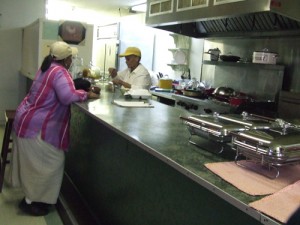by David Cecelski
Yesterday I was in HalifaxCounty and had dinner at one of my favorite country-cooking restaurants, the Resettlement Café in Tillery. This wonderful little establishment is located all by itself deep in the country, close by the Roanoke River, and surrounded by great fields of sweet potatoes, cotton and soybeans.
The proprietor, Ms. Evangeline, runs the place with grace, soul, and boundless hospitality. You can’t help but feel comforted in her dining room, which, seeing as how I had just come from a funeral of a dear, dear friend in Scotland Neck, was just what I needed. She’s also just a lovely woman, brilliant and vastly accomplished. Anyone would be happy just to be in her company.
And oh can she cook! My friend and I sat at one of the café’s long, community-style tables and drank her special iced tea, sweetened with brown sugar and honey, and watched her fix our meal from scratch on a big iron stove just across the counter from the dining room.
The smell of the fish frying was balm to my grieving soul. And while she cooked, I watched the regulars go in and out and I listened to the lovely lilt of Ms. Evangeline’s voice as she asked them about their mommas and their young’uns. Several of her customers had just come from the two prisons up the road—Caledonia, the big state prison known as “the Farm,” and the TilleryCorrectionalCenter, a lower-security prison. A lot of them were in a hurry, just grabbing a plate of pork chops, salmon cakes or fried chicken and heading home after a 12-hour shift.
Others lingered though and I understood why—the café is like a loving home’s dining room. Diners share big tables if the little tables are full, they pass the tea from table to table, and you can take your pick of soft, upholstered chairs and sofas scattered around the room. Most everybody knew everybody, and if a stranger showed up, they made him feel at home.
I enjoyed the feeling of neighborliness and of struggle. A bulletin board was full of news about the Concerned Citizens of Tillery, the pioneering activist group that has been a national leader in fighting for the rights of black farmers and against the environmental dangers posed by the corporate hog industry. A sign by the counter said that you could also register to vote there.
There were posters announcing birthday parties for local senior citizens, others touting the accomplishments of the area’s college students, and signs for all kinds of community meetings, some of them to be held right there at the café. A big placard also highlighted Tillery’s remarkable history as a federal resettlement community for black farmers during the Great Depression.
And oh, our dinner was good! Ms. Evangeline started our meal with a green salad served with a sliced soft-boiled egg and her own made-from-scratch buttermilk ranch dressing. Then she brought us a big plate of fried flounder, a tray of fried cornbread, and serving bowls of cabbage, a steamed vegetable medley, and stewed white potatoes. She served them family-style, so that we just took what we wanted out of the serving bowls. All of it was wonderful.
I could have made a meal just out of the fried cornbread, it was so good. The fish was also sweet and delicious, and the stewed potatoes were as good as any I’ve ever had—tender, peppery and consoling. We had just taken our first bites when an old friend from Tillery came into the café, too, along with two of his co-workers, and they all joined us. Then finally Ms. Evangeline sat down with us, too, and we all ate and told stories and laughed.
The Resettlement Café is located on state highway 561 N. in Tillery and serves 3 meals a day on Wednesdays, Thursdays, Fridays and Saturdays. You can call ahead for specials— (252) 826-4076 .

Leave a Reply